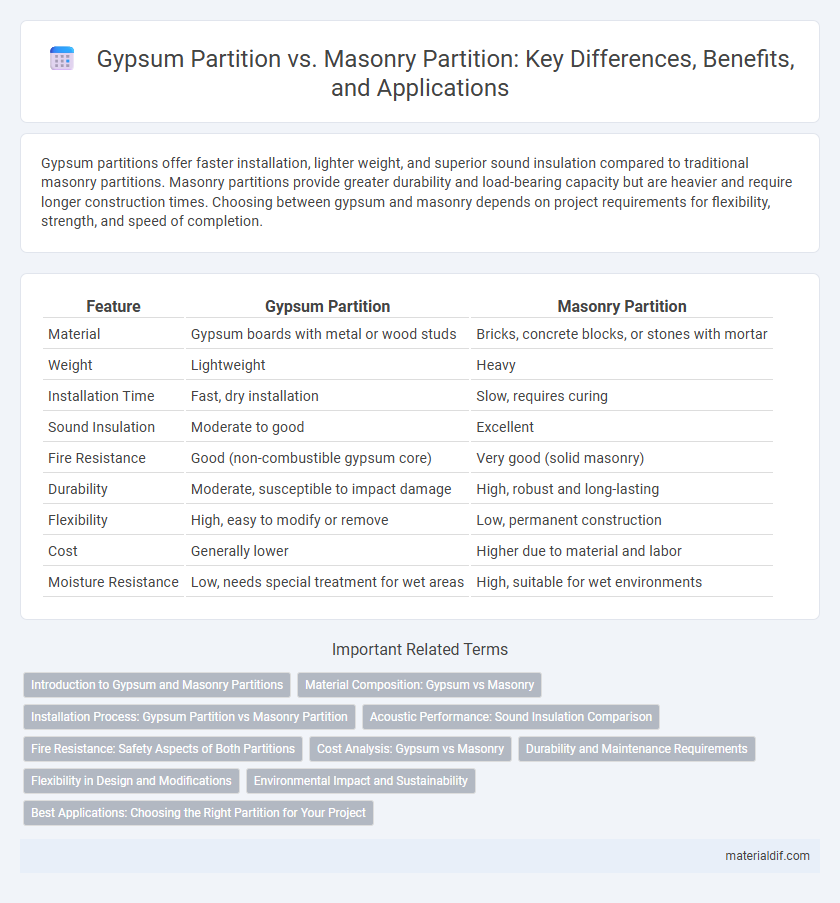Gypsum partitions offer faster installation, lighter weight, and superior sound insulation compared to traditional masonry partitions. Masonry partitions provide greater durability and load-bearing capacity but are heavier and require longer construction times. Choosing between gypsum and masonry depends on project requirements for flexibility, strength, and speed of completion.
Table of Comparison
| Feature | Gypsum Partition | Masonry Partition |
|---|---|---|
| Material | Gypsum boards with metal or wood studs | Bricks, concrete blocks, or stones with mortar |
| Weight | Lightweight | Heavy |
| Installation Time | Fast, dry installation | Slow, requires curing |
| Sound Insulation | Moderate to good | Excellent |
| Fire Resistance | Good (non-combustible gypsum core) | Very good (solid masonry) |
| Durability | Moderate, susceptible to impact damage | High, robust and long-lasting |
| Flexibility | High, easy to modify or remove | Low, permanent construction |
| Cost | Generally lower | Higher due to material and labor |
| Moisture Resistance | Low, needs special treatment for wet areas | High, suitable for wet environments |
Introduction to Gypsum and Masonry Partitions
Gypsum partitions are lightweight, non-load-bearing walls made from gypsum boards attached to a metal or wooden frame, offering quick installation and fire resistance. Masonry partitions consist of solid materials such as bricks, concrete blocks, or stones, providing enhanced durability and sound insulation but requiring longer construction time. Both gypsum and masonry partitions serve as effective space dividers, with gypsum favored for flexibility and speed, while masonry is chosen for strength and permanence.
Material Composition: Gypsum vs Masonry
Gypsum partitions consist primarily of gypsum plaster sandwiched between paper facings, making them lightweight and easy to install, while masonry partitions are made from dense materials such as bricks, concrete blocks, or stones, offering superior strength and sound insulation. The calcium sulfate dihydrate in gypsum boards provides fire resistance and moisture regulation, whereas masonry materials rely on natural density and thickness for durability and thermal mass. Differences in material composition influence factors such as weight, structural support, and acoustic performance in building construction.
Installation Process: Gypsum Partition vs Masonry Partition
Gypsum partitions offer faster installation processes due to their lightweight panels and dry construction method, significantly reducing labor time and site disruption compared to masonry partitions, which require extensive curing periods for bricks or blocks and mortar. The precision of gypsum boards allows for easy customization and modification on-site, contrasting with the rigid and time-intensive masonry installation. This efficiency in erection and finishing makes gypsum partitions preferable for projects emphasizing speed and workflow continuity.
Acoustic Performance: Sound Insulation Comparison
Gypsum partitions offer superior acoustic performance compared to masonry partitions due to their lightweight, multi-layered structure incorporating sound-absorbing materials that effectively reduce airborne noise transmission. Masonry partitions, being dense and rigid, provide good sound insulation but often lack the flexibility to integrate advanced acoustic treatments, resulting in lower impact noise attenuation. For environments requiring enhanced soundproofing, gypsum partitions deliver better sound insulation values, measured by higher Sound Transmission Class (STC) ratings, thereby improving overall acoustic comfort.
Fire Resistance: Safety Aspects of Both Partitions
Gypsum partitions offer superior fire resistance due to their non-combustible nature and calcium sulfate composition, which slows heat transfer and prevents fire spread. Masonry partitions, typically made from bricks or concrete blocks, provide substantial structural fire resistance but may crack under intense heat, compromising integrity. Fire-rated gypsum board partitions comply with UL fire-resistance standards, making them ideal for safety-critical environments requiring effective flame retardancy and smoke control.
Cost Analysis: Gypsum vs Masonry
Gypsum partitions generally offer a lower initial cost compared to masonry partitions, reducing both material expenses and labor hours due to their lightweight and easy installation. Masonry partitions involve higher costs attributed to durable materials like bricks or concrete blocks and increased construction time from skilled labor requirements. Maintenance and repair expenses also tend to be lower with gypsum due to its flexibility and resistance to cracking, enhancing overall cost-efficiency in interior partitioning.
Durability and Maintenance Requirements
Gypsum partitions offer moderate durability suitable for interior walls but are more susceptible to impact damage compared to masonry partitions, which provide superior strength and longer-lasting resilience. Maintenance requirements for gypsum partitions involve regular touch-ups and patching due to their vulnerability to dents and moisture, whereas masonry partitions require minimal upkeep, primarily occasional cleaning and mortar repairs. The fire-resistant properties of gypsum add safety advantages but do not enhance its physical durability relative to masonry.
Flexibility in Design and Modifications
Gypsum partitions offer superior flexibility in design and modifications compared to masonry partitions, allowing for easy customization of shapes, sizes, and finishes to meet diverse architectural needs. The lightweight nature of gypsum panels enables quick installation and effortless adjustments, reducing downtime during renovations or layout changes. In contrast, masonry partitions are rigid and labor-intensive, making post-construction modifications costly and time-consuming.
Environmental Impact and Sustainability
Gypsum partitions generate significantly less construction waste and have a lower embodied carbon footprint compared to traditional masonry partitions, contributing to more sustainable building practices. Their materials are often recyclable and sourced from industrial by-products, reducing the depletion of natural resources. Masonry partitions require energy-intensive processes and raw materials like clay and sand, resulting in higher carbon emissions and more environmental disturbance.
Best Applications: Choosing the Right Partition for Your Project
Gypsum partitions excel in residential and commercial interiors where quick installation, lightweight materials, and smooth finishes are essential, ideal for office spaces and modern homes. Masonry partitions provide superior durability, sound insulation, and fire resistance, making them suitable for load-bearing walls and high-traffic areas like schools and hospitals. Selecting the right partition involves assessing factors such as budget, structural requirements, and desired acoustics to ensure optimal performance and aesthetics.
Gypsum partition vs Masonry partition Infographic

 materialdif.com
materialdif.com